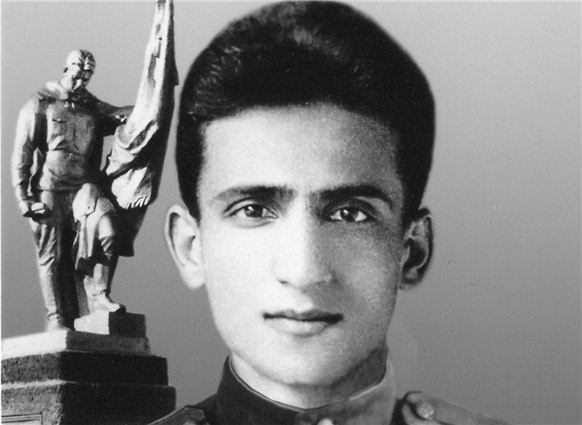Chaim Nisanov was born in 1917 in Gyrmyzy Gasaba (in Russian – Krasnaia Sloboda), a famous Jewish area on the outskirts of the town of Kuba in Azerbaijan, into a family of Mountain Jews. In 1931, he graduated from a seven-year school and began an administrative career. In 1938, after graduating from a technical school in Baku, Nisanov became a secretary of the Party council (soviet) in Kuba.
After the German attack on the Soviet Union in June 1941, Nisanov continued to hold his position, but when the second German offensive began in the spring of 1942, he volunteered to serve at the front. He became the political commissar (from October 1942 the "deputy commander for political matters") of a company of the 690th Rifle Regiment that was deployed in the Northern Caucasus. At this time, the regiment was taking part in the Stalingrad Operation.
In January 1943, during the final stage of the Stalingrad Operation, the 690th Regiment was ordered to recapture the Cossack settlement (stanitsa) of Proletarskaia, where there was an important railway station. Although the enemy defended the eastern approach to the settlement fiercely, the regiment succeeded in advancing to some degree. At this stage, the commander of Nisanov's battalion was killed, and his second in command Senior Lieutenant Nisanov, assumed command. Meanwhile, the Germans mounted a counter-offensive and the regiment was surrounded. In an attempt to break out Nisanov's unit took cover in an abandoned brick factory. Nisanov was wounded twice, but rejected the enemy's proposition of surrender. The Germans fired from artillery and tanks at the defenders of the brick factory. Almost all of the Red Army men of his company, including Nisanov, were killed.
Two days after the liberation of Proletarskaia, Nisanov and his men were buried in a common grave. He was posthumously awarded the Order of the Red Banner. After the war, General School No. 4 in the town of Proletarsk was name in his honor.
In 1943, an article on Nisanov was prepared for publication in the Moscow Yiddish newspaper Eynikayt.







